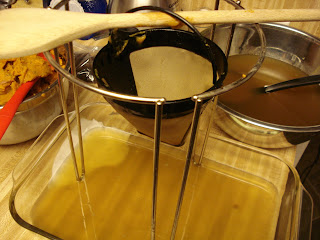I started with 10 large sweet potatoes, acquired from my local grocery store. I am not sure of the weight of the purchase, as I was going to record it from my receipt from the grocery store, but I managed to misplace the receipt. I took each potato and cut it into four pieces length-wise, and then cut those wedges into individual quarter-slices, as shown below.
In the 1920 article, they talked about using shredded sweet potatoes or sweet potato flour. While I think that the shredded sweet potato would have worked well (as well as saving my poor thumb, the tip of which I cut off while I was chopping sweet potatoes), I think that flour would have made filtering an enormous hassle. The quarter-slices worked well, however, yielding two large bowls of slices.
Endeavoring to follow the paper's steps somewhat, I decided to roughly follow their process, which seemed to work pretty well. I added the sweet potatoes to the pan with water to cover (I added a little extra water, which I'll comment on later in the article), and started heating up the mixture over medium heat.
After fifteen minutes of heating, I checked the temperature on the electronic thermometer, for which you can see a bit of the sensor and its wire in the above picture. The temperatures were recorded during heating as follows:
| Mins. | °F | Heat |
|---|---|---|
| 15 | 157 | 5 |
| 30 | 160 | 1 |
| 70 | 180 | 3 |
| 80 | 189 | 5 |
| 90 | 197 | 5 |
| 100 | 208 | 5 |
| 105 | 210 | 5 |
| 110 | 212 | 5 |
I intend to improve the process in the future, and I have some very specific ideas for how to do so. Instead of integrating the enzymatic action and heating to boiling, I'll use water to cover heated to about 170°F. After adding the sweet potatoes, I'll put the whole concoction in my (now temperature controlled, more about that in a later post) light bulb oven, and let it convert for about 2 hours. I'll then boil it on the stove and, instead of mashing the pulp and sieving it, I'll remove most the water by straining, and then use a hand blender to process it into a paste. I'll then create a large filter by putting a piece of wool felt over the top of a bucket, with the cut off top of another bucket holding it in place. As I understand it, wool is better for filtering syrup, as it doesn't clog as easily and filters more thoroughly.
Next time I do this, I'll likely also use malt in the mixture. My intention is to make a simple sweet potato beer and, since sweet potato doesn't contain the necessary amino compounds to support yeast fermentation, malt is necessary for the conversion into beer. This sweet potato and malt beer will then be converted into vinegar, to be used as the base for a Worcestershire-like sauce, possibly tomato-based, that I'll be making.







No comments:
Post a Comment